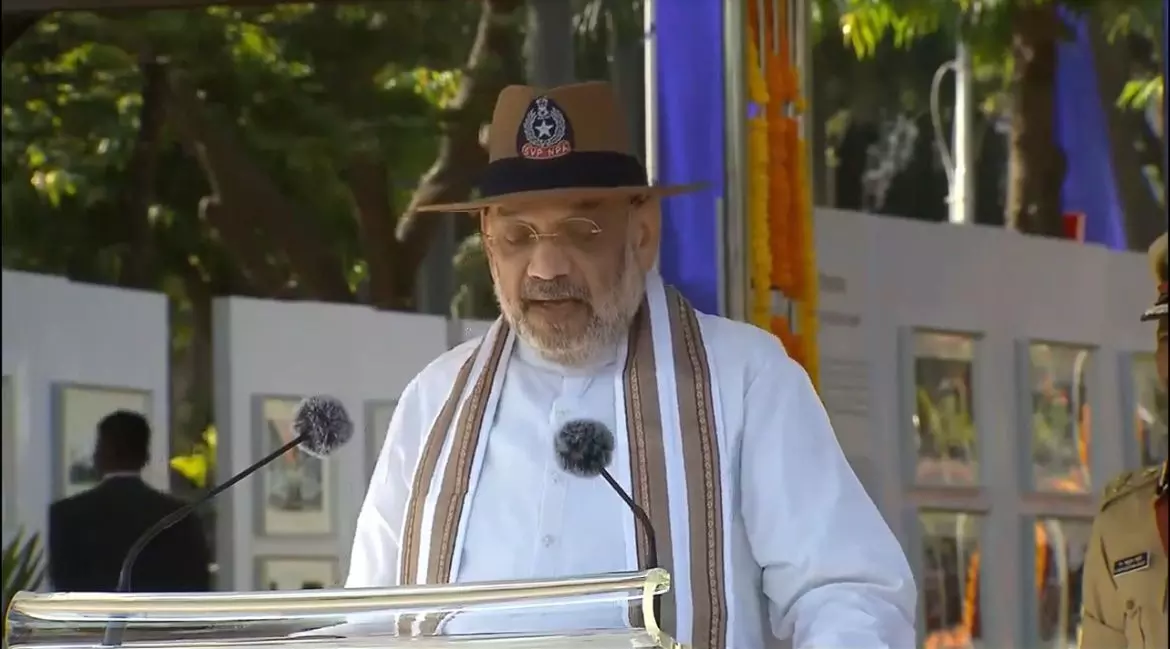Amit Shah urges IPS probationers at SVPNPA to adopt new tech in policing
The minister said that the rules that the Centre has introduced will redefine people’s understanding of terrorism, and organised crimes and provide new provisions for inter-state conflicts etc
By Sulogna Mehta
Hyderabad: “New laws for the criminal justice system will soon come into force replacing the pre-independent, colonial-era laws prevailing since the 1850s such as CRPC, IPC and Evidence Act,” said Union Minister Amit Shah, explaining the three bills introduced by the Central government in the Parliament recently.
The home minister was addressing a gathering at the passing out parade of the 75th Regular Recruit (RR) IPS batch at the Sardar Vallabhbhai Patel National Police Academy (SVPNPA) in Hyderabad on Friday morning.
“A committee of experts is studying the three bills. Soon, the bill become law and our new criminal justice system will come into effect, ushering in an era of change,” said Amit Shah.
Shah further said, “The new bills are meant for securing the rights of the public unlike the laws during the British times, which were meant for protecting an unjust administration. As 75th RR IPS batch, you will have new laws to implement in letter and spirit.”
The minister said that the rules that the Centre has introduced will redefine people’s understanding of terrorism, and organised crimes and provide new provisions for inter-state conflicts, digitisation, investigation, chargesheet timeline, forensics etc.
‘Keep fighting against new age crimes’
Addressing the dignitaries and IPS probationary officers at the passing out parade, Shah said, “After a lot of sacrifices, we have achieved independence. Over 36,500 jawans have sacrificed themselves so far to serve the country. Their life’s work should be our inspiration and pave the way forward. Over the last 10 years, we have curbed the threats from terrorism, Maoism or Naxalism to an extent even as further challenges still linger. We have to keep up the fight against many other challenges such as organised crime, cybercrime, international financial crime, interstate gangs, narcotics, cryptocurrency that can weaken the economy, hawala, and fake currency that keep evolving with the changing times.”
Shah said that the three hotspots including Northeast India, Maoist militancy and Jammu and Kashmir have been successfully managed. “From 2004 to 2014, there had been 33,200 incidents of violence in these hotspots, which we have been able to restrict to 12,000. Deaths have been reduced by 73 per cent. From the zero-tolerance policy towards terrorism, we now have a zero-tolerance strategy and zero-tolerance action towards terrorism,” he said.
‘Make use of technological advancements’
Shah also informed that in the last nine years, a lot of work pertaining to database building, integration and mutual communication has been taken up.
“Computerised police stations, prisoners’ data and courts and forensic data and fingerprint, integrated monitoring of terrorism data, cybercrime reporting data, and biometric data are available online. The police should make use of Artificial Intelligence (AI) to stay ahead,” he said.
Addressing the ‘technocrat batch’ of probationary officers, most of whom have a technical background, Shah suggested preventive, predictive and proactive policing instead of just a response-based move. He also emphasised inculcating sympathetic policing and going above bookish approach to understanding the people.
“Police Technology Mission has been established by the prime minister and you should practically utilise the technology in policing and solving problems to stay ahead of criminals. You, as probationary officers, have taken indoor and outdoor training in strategic areas for all-round development,” he said.
Calling for sacrifice, surrender to the country, hard work and dedication, Shah said, “After 25 years, when the centenary year of Indian Independence will be celebrated, you will be at the top of your service, leading the police forces, making the country secure and safe. Everyone should be guaranteed their constitutional rights as well. So, this 75th batch has a significance of its own. In this ‘Amritkaal,’ it is time to take a pledge and make India top of the world in all fields in the next 25 years.”
Shah referred to the Iron Man of India Sardar Vallabh Bhai Patel, who played a key role in uniting the country and also in creating a training institute to train IPS officers, which is named after him.
“This academy is the first college of its type in India. In the last 75 years, IPS passouts have created a history in strengthening the security and glory of the country. It is the responsibility of the trainee officers in front of me to take the country forward and add many golden moments. Of the 175 probationary officers, 20 foreign officers from Bhutan, Maldives, Nepal and Mauritius took training. Among the 155 Indian officers, it is noteworthy that 34 are women officers. And for the first time, a woman trainee officer Ranjita Sharma received the IPS Association’s Sword of Honour Award,” said Shah and mentioned how the government paved the way for the 33 per cent reservation for women in the Parliament.